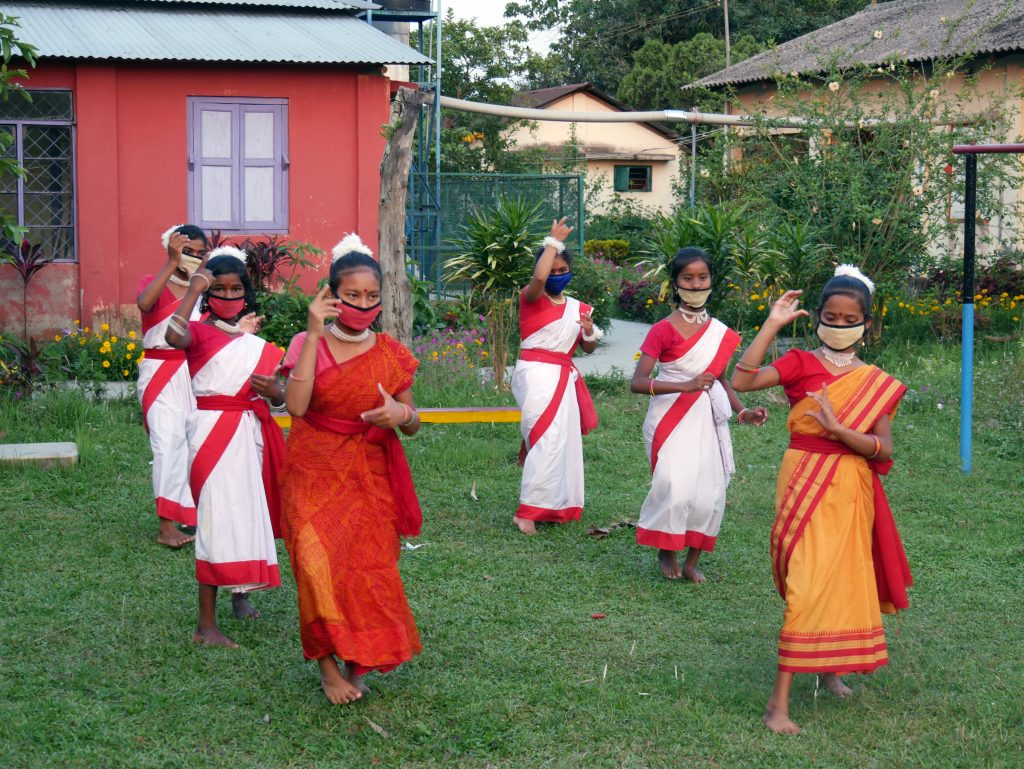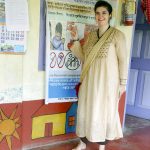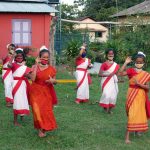
Danse masquée
I left my suitcases in Mogradangi Home, the centre for young boys with disabilities, in the district of Jalpaiguri. I was lucky enough to meet its founder, Father François Laborde, a few days after my arrival. My main task was to accompany the special boys to the Manus Domini adapted school, which is located in the Bakuabari Home girls’ centre. After school, I had a number of activities: playing with the boys, giving computer lessons, peeling vegetables … In the beginning, I did not know exactly how to go about it, the language barrier did not make it easy. Eventually I started to find my rhythm, but that didn’t last.
Lockdown
On March 13, 2020, I was invited to spend the weekend at the Bakuabari Home to give computer lessons to the girls. On Friday morning, I left with the boys to go to school with just a small bag, expecting to stay only a few days. During the weekend, the government announced the first measures to combat coronavirus as well as the closure of schools. As a result my pupils did not come on Monday and I did not return to Mogradangi. So I have been living with the girls for nine months now. The first few days went well. The girls met at school during school time to study. I helped them with English. In the afternoon, I taught a computer class. The girls started making masks with scraps of fabric, bags, etc. We weren’t officially locked down yet, but I was already not permitted to go out and had to distance myself from the girls. People only talked about coronavirus, the ‘big girls’ were even singing ‘Corona Corona’. The buildings were cleaned one by one. In the end, we weren’t officially freed from lockdown until May 31. But we stayed locked up for fear of the virus. In mid-July, the government declared two days of lockdown per week. It was tough on morale. I no longer dared approach the children, but you had to stay positive and live through this period calmly. Luckily, I was able to recover some of my things. Fortunately, this difficult situation did not last. We started talking a lot less about the virus, the sun was shining – very good for morale – and above all, I decided that it was a shame to keep away from the children. Since the centre had been closed to visitors since March, we had to look after around forty girls with reduced staff. With the epidemic, there are far fewer people coming from outside. But I remained cautious.
Adapting to the unexpected
So I had to adapt to the situation. I am in the kitchen from 6am preparing breakfast. After that my days are very full. I help with the meals of the youngest and with bedtime. I teach the girls to use software on the computer. To keep them studying, the teachers send a lot of audio or video files by WhatsApp. It is my job to show them the exercises and to transfer the videos to the computer, which has a more readable screen than the smartphone. I have introduced the children to many films. I help with English during study time in the evening. I have even become a DJ! Every Sunday morning, the girls ask me for music to dance to. They wait for me to arrive and shout delightedly which touches me deeply.
In addition to studying, the children have a variety of activities: gardening, dancing, singing … At the beginning of May, after a month and a half without going out, I had the opportunity to go back to Mogradangi. I went there once a month thereafter for a report or for computer issues. It was a great joy to see the boys again. Since September, I have been going there twice a week to give computer lessons to the teachers at the school. Despite the unprecedented situation, my mission has been wonderful. I have learned self-confidence and to go beyond what I thought I was capable of, being the only volunteer in my mission. Covid-19 gave me an amazing gift: to be able to spend so much time with the children and to see them growing up. The girls have really tried to get in touch with me and to talk to me. So I have made progress in Bengali, perhaps faster than if my assignment had been in normal times.
Smiles
Covid-19 has not taken away from these little girls the joy and the smiles that brighten my days. Granted, it wasn’t always an easy time for the children who couldn’t return home, but I tried to encourage them and make them laugh. At the end of October, the children were finally able to return to their families, after a year at the centre. When they came back, they spent two weeks in quarantine. Since March, there is no more Mass on Sundays. So I nourish myself spiritually by reading the Bible. Although the children are of different faiths (Hindu, Muslim, Christian …), there is a prayer every evening. Father Laurent came to Jalpaiguri for a month in September and returned in November. So I was lucky enough to be able to attend the daily mass he celebrates in Bengali. ‘Life is a challenge, meet it’, Mother Teresa tells us. At the start of lockdown, I decided to make my mission even more amazing and I succeeded. I am delighted to have been able to extend it by another six months. I have a lot of admiration for these children who, despite their disabilities, always have a smile on their face. This omnipresent joy is a magnificent lesson in life.
Florence de Morel, MEP volunteer
- Florence devant une campagne d’information sur le Covid
- Danse masquée

